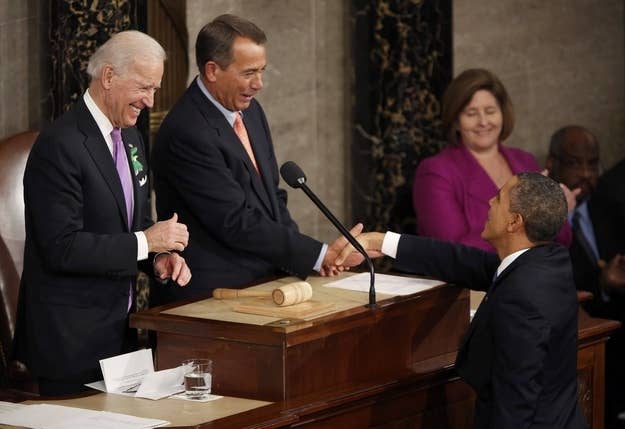
WASHINGTON — It's an open secret in Washington that next Friday the federal government will be forced to undertake massive spending cuts that hit the military, first responders, and teachers — and nobody is doing anything to stop it.
Senior Obama administration officials told reporters Tuesday that the cuts, known as the sequester, will hit next week unless Republicans accept revenue-raising tax reforms. Republican leaders said it will hit unless Obama forswears any effort to raise revenue. Either way, the two sides aren't negotiating with each other. With the clock counting down to March 1 and with the two sides stuck at the same impasse for the past six weeks, the result is clear: the sequester will take effect.
President Barack Obama took the stage in the Eisenhower Executive Office Building earlier in the day to warn of the dire consequences of the cuts — for at least the third time top officials have done so this month.
"These cuts are not smart," Obama said. "They are not fair. They will hurt our economy. They will add hundreds of thousands of Americans to the unemployment rolls. This is not an abstraction — people will lose their jobs. The unemployment rate might tick up again."
But Obama was silent on his plans to avert the sequester, despite White House assurances that he is "leading," indeed, because he has none other than Republicans acquiescing to his demands.
A mile away on Capitol Hill, the flags are down and the lights are off as lawmakers are in their districts for the week.
"Washington Democrats' newfound concern about the president's sequester is appreciated, but words alone won't avert it," said Speaker of the House John Boehner in a statement. "Replacing the president's sequester will require a plan to cut spending that will put us on the path to a budget that is balanced in 10 years. To keep these first responders on the job, what other spending is the president willing to cut?"
Officials warned that there is no way in existing law to shift money around — all programs would be cut by the same amount: 9 percent for non-defense programs and 13 percent for defense programs.
And though aides say Obama and his administration are working at all levels to deal with the mandatory cuts along with other legislative priorities, GOP aides say Obama haven't spoken top congressional Republicans since the inauguration nearly a month ago.
Instead of talking, officials on both sides have traded barbs over who "owns" the sequester. The GOP has branded it the "Obamaquester," while the Democratic Congressional Campaign Committee called it "House Republicans' Sequester" just Tuesday. But the bottom line is, the White House proposed it, Republicans overwhelmingly backed it, and Obama signed it — and thus far none of them have made progress in averting it.
Administration officials did little Tuesday to express optimism that a deal can be struck by next week, noting only that Republicans caved late last year on their steadfast opposition to raising tax rates. (Republicans note Obama caved the year before, agreeing to a spending-cut-only measure that also created the sequester.)
No one else is optimistic either.
"We've been betting against there being a deal for weeks," one senior executive branch official told BuzzFeed, adding "This time just never seemed like the other crises."
Republicans frequently point out that they twice passed bills to deal with the sequester, but the administration officials noted those bills expired earlier this year when the 113th Congress convened. Congressional Democrats have introduced their own proposal, but it has been met with derision from Republicans.
And contrary to the fear both sides are trying to instill, few, if any, government programs are likely to be cut on March 2nd. Layoff and furlough notices will be sent on the worry that the sequester remains permanent — an almost inconceivable occurrence given the long-term effects.
The most likely scenario, according to officials on both sides of Pennsylvania Ave., is that Congress will kick the can on the sequester until the government's budget authority runs out on March 27. Congress will have to pass a continuing resolution by that date, or the government will be shut down.
Indeed the shutdown is a more acute, if routine, threat — with nearly all of the government ceasing to operate immediately instead of broad-based spending reductions.
"I think it may be the alternative that's available," House Minority Whip Steny Hoyer told BuzzFeed of combing the sequester and a temporary spending measure. "I think that's a mistake. I think the sequester is going to be harmful. It will not be a cliff. It will not be harmful on March 2, but it will be harmful over time."

